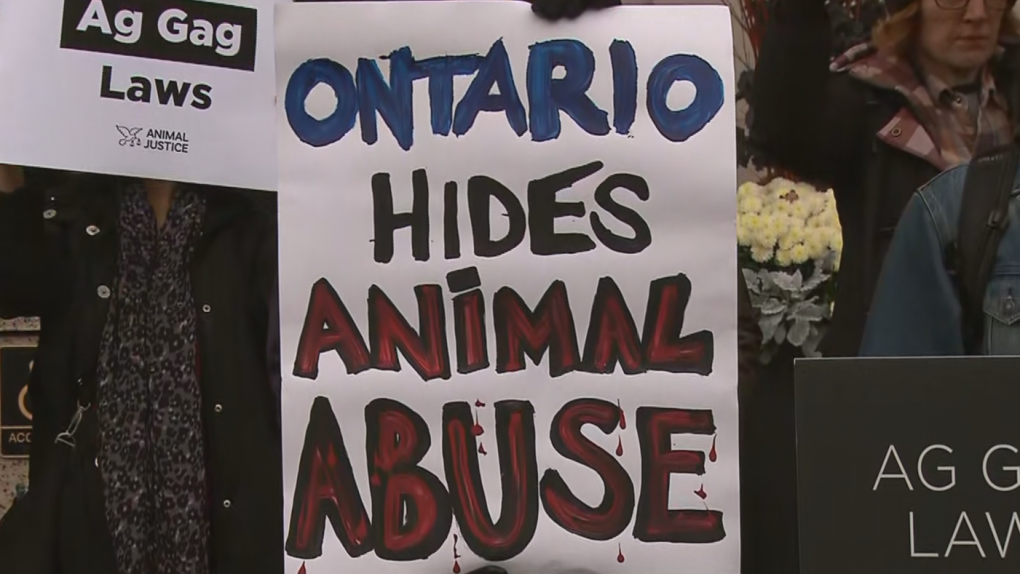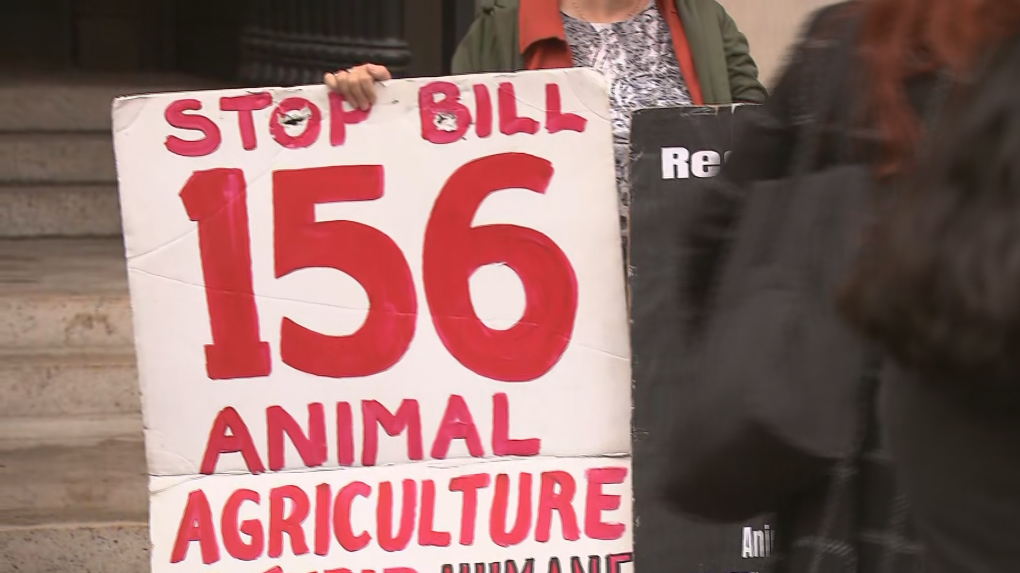Court battle over Ontario's agriculture 'gag' laws kicks off in Toronto
A constitutional challenge of recent Ontario legislation that prevents the undercover filming of factory farms and the animals kept on them kicked off in a Toronto courthouse on Monday morning.
The application, to be heard on Oct. 30 and Nov. 1 by Superior Court of Justice Judge Markus Koehnen, is seeking to overturn the Security from Trespass and Animal Safety Act, a set of laws passed in 2020 that increased fines for people who trespass on Ontario farms and made it illegal to obstruct trucks carrying animals to such farms.
- Download our app to get local alerts on your device
- Get the latest local updates right to your inbox
Launched by advocacy group Animal Justice, alongside journalists and activists Jessica Scott-Reid and Louise Jorgensen, in 2021, the challenge argues that the Act violates the Canadian Charter of Rights and Freedoms.
“We believe it violates section 2B [..] which guarantees the right to freedom of expression,” Camille Labchuk, lawyer and executive director of Animal Justice, told CTV News Toronto on Sunday.
“The right to free expression allows you to see what you want and not be censored, but it also allows the right to freely receive information as a member of the public, and we say, in this case, the government is imposing limits on those rights.”
The group is also challenging the section of the law that imposes fines on those who interact with farm animals on trucks, which in turn can limit the ability of journalists or activists to document those animals, it argues.
“Those are powerful images,” Labchuk said. “They make a real impact on the public and they deserve to be seen.”
When reached for comment, a spokesperson for the Ministry of the Attorney General said that the province’s position is that the regulations included in the Act are constitutional.
“The Legislation does not impede expression by activists, journalists, or anyone else, nor does it otherwise breach the Charter,” a statement provided by spokesperson Maher Abdurahman said, adding that to provide any further comment while the matter was before the courts would be inappropriate.
When Ontario passed the Security from Trespass and Animal Safety Act, the then-Minister of Agriculture in 2020, Food and Rural Affairs, Ernie Hardeman, said the law would serve to protect farmers on their property.
"Individuals would never tolerate having strangers unlawfully enter their homes and to be threatened and harassed by those strangers. Farmers are no different and deserve the same protection under the law," Hardeman said.
READ MORE: Farmers rejoice, animal activists irate over ag protection bill
But others have sounded alarm bells on the measures, identifying the Act as what’s commonly known as an agricultural gag law, or an ‘ag-gag’ law, explained Labchuk.
Ag-gag laws, originating in the United States in the early 1990s, are designed to restrict the gathering and circulation of information that show the conditions in which farmed animals are raised, transported, and slaughtered. They were a direct result of undercover farm investigations beginning to be aired on nightly news, upsetting viewers, explained Labchuk.
“It's very, very difficult to get information on farm animals kept on private property behind closed doors,” Labchuk said.
To further limit that ability is to infringe upon rights, she argues.
“It's a really, really valuable form of expression, exactly the kind that the charter wants to promote,” she said.
Labchuk underlines that there are virtually no other industries, in Canada or the United States, that such laws apply to, “not a single one.”
While Ontario, Alberta, Manitoba, and PEI have all passed laws that limit the ability to operate undercover investigations on farms, this week’s hearing marks the first legal challenge to an ag-gag law in Canada.
A similar law, Bill C-275, has been proposed at the federal level. It completed its second reading in June and is soon set to be voted on.
 Someone holds a sign that reads, 'Ontario hides animal abuse,' at a rally outside the Ontario Superior Court of Justice on Oct. 30, 2023. (CP24)
Someone holds a sign that reads, 'Ontario hides animal abuse,' at a rally outside the Ontario Superior Court of Justice on Oct. 30, 2023. (CP24)
W5 UNDERCOVER FOOTAGE
In November 2020, CTV News’ W5 published an extensive investigation into an Ontario pig farm using video footage obtained by an undercover worker.
The footage revealed disturbing images of farm workers forcefully slapping and hitting pigs with plastic boards, and jabbing them with pens.
READ MORE: Undercover footage from Ontario pig farm shows alleged abuse but new laws may ban future probes
Other filmed incidents include workers discussing how pregnant sows had been deprived of drinking water for several days, workers castrating male piglets without the use of painkillers and filthy conditions in the barn.
The farm in question, Paragon Farms, said in a statement given to W5 at the time that it had immediately inspected the barn and “welcomed an inspection [by] Animal Welfare Services" within hours of being notified of the allegations.
W5’s investigation came just weeks before Ontario's Security from Trespass and Protecting Food Safety Act passed and came into effect, making it one of the last legal undercover investigations carried out on a large scale at an Ontario farm. In 2023, the farm’s parent entities, Ontario Management Group Inc. and Great Lakes Pork Inc., pleaded guilty to two offences under the Provincial Animal Welfare Act.
 Pigs can be seen at Arnold Barn where undercover footage was captured. (W5)
Pigs can be seen at Arnold Barn where undercover footage was captured. (W5)
A THREAT TO JOURNALISTS, PUBLIC INQUIRY: PROFESSOR
While many following this case come at the issue from the realm of animal advocacy, the consequences of Ontario’s ag-gag laws have consequences that expand past animal welfare.
“There are other unanticipated consequences to this type of careless legislation,” associate professor at the University of Western Ontario's Faculty of Law Samuel Trosow told CTV News Toronto.
“It really constrains the ability of people to engage in fact-finding,” Trosow, who was also recently elected to London, Ont.’s city council, said in an interview on Sunday.
Monday’s constitutional challenge should be of particular concern to journalists and anyone tasked with disseminating information, he said, warning that the effect on public inquiry could be “troubling.”
In June 2020, Trosow gave a testimony at the Ontario legislature to a committee tasked with reviewing the implications of the Security from Trespass and Animal Safety Act. In it, he argued the information that stands to be gathered at factory farms “promotes public awareness about our food supply” and provides “health and environmental researchers with crucial data.” He also argued that protection is afforded to Farmers under the Trespass to Property Act.
“There is a long history of media accounts based on whistle-blower-generated information that has had profound effects on public awareness, the generation of law, and the practices in the industry,” he said to the committee.
After Monday’s proceedings, Labchuk said she felt the first day went well.
“It has been very powerful to describe to the court some of the animal abuse that has been captured at farms, and the judge is listening carefully,” she said.
“We are optimistic that the court will appreciate how this law violates free expression under the Charter and strike down this dangerous law,” she continued.
The hearing is expected to finish by Wednesday, after which it usually takes several months for a decision.
 A sign can be seen at a rally outside the Ontario Superior Court of Justice on Oct. 30, 2023. (CP24)
A sign can be seen at a rally outside the Ontario Superior Court of Justice on Oct. 30, 2023. (CP24)
Correction
A previous version of this story erroneously stated Sam Trosow was at Western University. It has been updated.
CTVNews.ca Top Stories

Harris and Trump make a furious final push before U.S. election day
A campaign that has careened through a felony trial, incumbent being pushed off the ticket and assassination attempts comes down to Election Day on Tuesday.
Communication issues, double standard for Lebanese-Canadians trying to escape war, says lawyer
Some Lebanese-Canadians are pressuring the federal government to implement emergency measures that would allow Lebanese nationals' family members a less restrictive gateway to Canada, citing more 'flexible' policies for Ukrainians.
Peel police officer suspended after video appeared to show him at protest while off duty
Peel police say four people were arrested and an officer was injured following several protests in Mississauga and Brampton Sunday afternoon, including one at a Hindu temple that turned violent.
Musk PAC tells Philadelphia judge the US$1M sweepstakes winners are not chosen by chance
A lawyer for Elon Musk 's political action committee told a judge in Philadelphia on Monday that so-called 'winners' of his US$1 million-a-day voter sweepstakes in swing states are not chosen by chance but are instead chosen to be paid 'spokespeople' for the group.
B.C. port employers to launch lockout at terminals as labour disruption begins
Employers at British Columbia ports say they are going ahead with locking out more than 700 foremen across the province after strike activities from union members began.
Pair of tornadoes touch down in 2 New Brunswick communities last week
A research team has confirmed a pair of tornadoes touched down in central New Brunswick last week.
3 arrested as protesters clash outside Hindu temple in Surrey, B.C.
Three people were arrested after duelling protests erupted into violence outside a Hindu temple in Surrey, B.C., over the weekend, according to the RCMP.
She was diagnosed with Type 2 diabetes about a year ago. Here's how her condition was reversed
A year ago, Lorraine O'Quinn was coping with stress, chronic illness and Type 2 diabetes. Then she discovered a health program that she says changed her life.
Daylight savings can negatively affect worker productivity, research says
New research from the University of Oregon finds the annual practice of ‘springing forward’ into daylight time affects productivity more than previously thought.


































